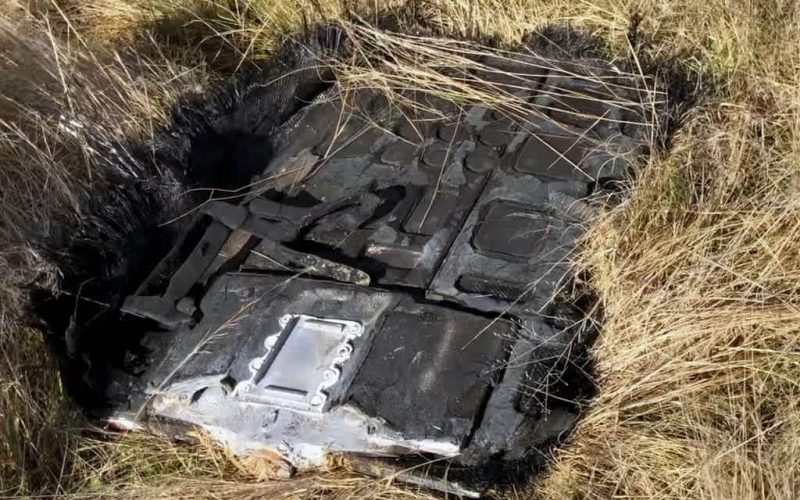In May 2023, space debris from a SpaceX satellite launch fell across multiple districts in western Uganda. Landing in an area with a 40-kilometer radius, the debris and damaged property in Kyegegwa, Sembabule, and Kyenjojo. Fortunately, no injuries occurred. However, the incident has raised questions about accountability and the risks posed by falling space debris.
Details of the Debris and Its Effects
A forensic analysis by Uganda’s National Forensic Sciences University (NFSU) and the Airforce revealed that the debris consisted of fragments made from advanced materials. These include carbon fiber and specialized alloys. These materials, designed to withstand extreme conditions, allowed significant portions of the debris to remain intact upon re-entry.
One piece of debris crashed through a house roof in Nakawala village, Sembabule, causing a loud explosion. These incidents left many residents alarmed. Experts confirmed that the debris entered the atmosphere at a steep angle, breaking into clusters that scattered across the region. The report identified the source as obsolete human-made objects in orbit, no longer serving any practical function.
This event in Uganda is not an isolated case. Comparisons were drawn with previous incidents involving SpaceX, including similar findings in Australia, the United States, and Canada.
Escalating Concerns About Space Debris
The Ugandan investigation underscored the growing hazards posed by space debris as private space exploration intensifies. Increasing satellite launches, particularly into low Earth orbit, have led to a buildup of inactive objects in space. This congestion heightens the risk of such incidents, as demonstrated by the debris linked to a mid-May SpaceX launch.
Globally, other incidents have also caused damage. For instance, in 2022, large fragments of space debris landed on farmland in Australia. The Ugandan report warns that rising space activity and inadequate control over debris could lead to more frequent and potentially dangerous situations.
Potential Legal Action Against SpaceX
Ugandan authorities are now considering legal action against SpaceX, citing their obligations under Article 7 of the United Nations Outer Space Treaty. This treaty holds launching states responsible for damages caused by their space objects. Uganda has until May 2025 to file a formal claim.
While SpaceX has previously cooperated in debris cleanup efforts, it has also maintained that most of its materials burn up during re-entry. However, incidents like this challenge the adequacy of those assurances. The Ugandan government may use this case to demand stricter accountability and stronger measures to prevent future occurrences.
This incident highlights the need for global solutions to address the increasing risks posed by space exploration and its associated debris.
Uganda to Sue SpaceX Over Falling Satellite Debris Incident
In May 2023, space debris from a SpaceX satellite launch fell across multiple districts in western Uganda.








